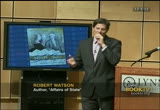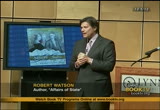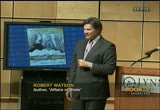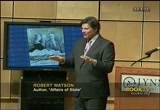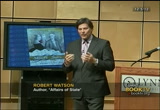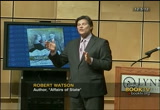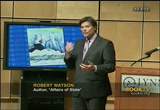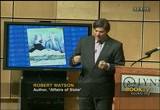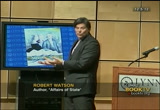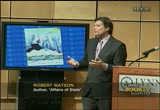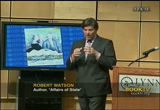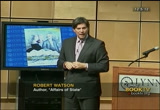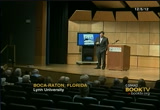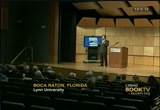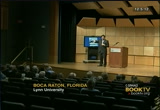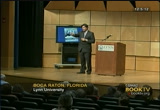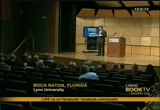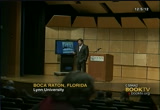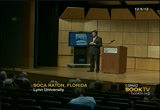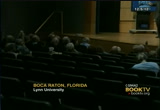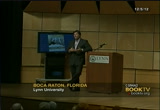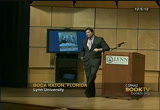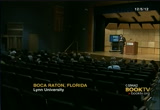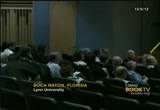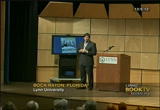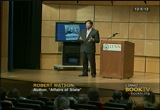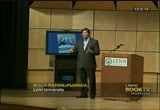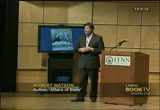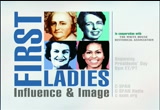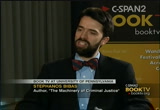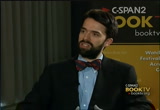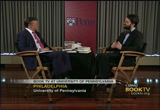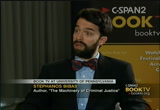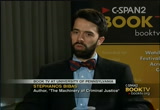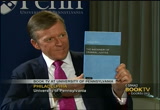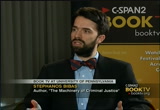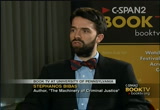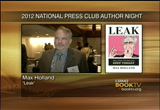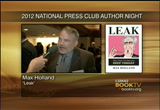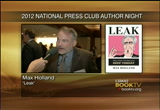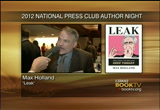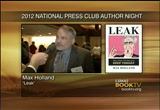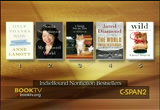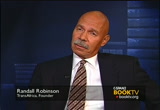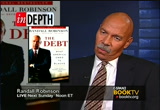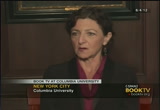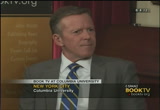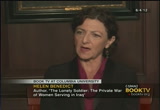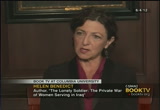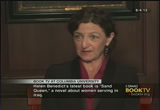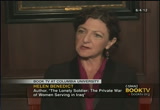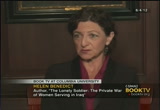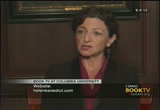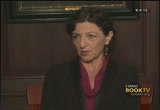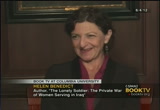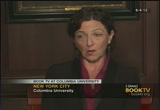tv Book TV CSPAN January 27, 2013 7:00am-8:00am EST
7:00 am
republicans today are gridlocked? daniel webster, the great politician and intellect, he had a popular toast he would give in washington. he'd say here's to the next cabinet, may they all be bachelors or widowers. [laughter] during months and months of gridlock, almost every member of jackson's inner circle opposed peggy. all of them except one. eventually, jackson fires his whole cabinet, reorganizes his government. basically because of little peg. ultimately, after two terms as president, eight years, jackson was so popular he could have won a third term. he was beloved by the people, despite the scandal or perhaps because of the scandal. the masses loved the great commoner, andrew jackson. some-aiz -- some of his
7:01 am
opponents had bad mouthed little peg and his wife, wanted to oppose him. so jackson reaches out to his kitchen cabinet about the only member of his inner circle who didn't say bad things about peg and gets that person to run in his place. that's martin van buren, the little magician, as they called him. otherwise ratherrer relevant politician. martin van buren is happened picked by jackson to continue his legacy. martin van buren wins. and jackson picks him because he's the only ally to jackson who doesn't treat peg bad. why is van buren who doesn't mind peg being around? van buren was a widower. [laughter] so it ties into that cabinet wives/petticoat government. so little peg, having a whore in the white house affected the outcome of a presidential
7:02 am
election in 1836. bizarre. so here's the punchline at the end. eaton dies, the secretary of war. he's older than little peg. and he did well financially, is so little peg does well in washington, d.c. as this extravagant bid toe that everyone likes to gossip about. and she goes to all the parties and makes the social pages. but little peg then shocks everyone by, she's a grandmother now, she marries a man decades younger than her, an italian ballet dancer, i think his name was antonio. [laughter] well, he's the ballet teacher for her granddaughter. she marries him. so cher, madonna, all the cougars here in boca raton got nothing on little peg. she was the first cougar. [laughter] so she marries a man decades younger than he was which was a huge controversy. they're out traveling, and one day she wakes up, and he's gone.
7:03 am
she goes back home, she finds out he went back to her home and cleaned her out, takes her granddaughter and goes back to italy. so now she's destitute. this is before social security, medicare, unemployment comp and everything else, all these entitlement programs. so little peg is now this widow who's living, basically, in poverty. and when she dies, she's buried in the uppity semimare because she was the -- cemetery because she was of the wife of eaton. the women in washington always hated her, but here is the obituary. she's now their neighbor forever. they were all buried -- [laughter] let me do one more story, and then we'll take some questions, and there's a microphone here. george washington. arguably one of the greatest, if not the greatest americans ever. who else among the founders and framers could have taken a ragtag band of poorly educated farmers and ill-equipped black smiths and defeat the world's
7:04 am
greatest military? not ben franklin, not james madison, not thomas jefferson, only george. so george is a great, great man. and i think part of the reason historians haven't focused on his marriage and affairs because somehow it would be seen as diminishing him, and doesn't every great leader claim to be a self-made man? as a matter of fact, a lot of them are mother-made men or wife-made men or mistress-made men. washington could have been all of the above. when george was a young man, he had a great, great goal of being a gentleman planter and an officer in the british military. he wanted to be, you know, very important. the problem for george was this. while his father, augustine, did okay, george was the first-born son of the second marriage. and when augustine died when george was a little boy, augustine left almost everything to his sons from his first marriage because augustine had rotten marriage with his second wife.
7:05 am
she was sort of a high maintenance, whiny -- everybody watch sign peld? remember george's mother? i've always thought if we did a movie about this, cast her as mary ball. long story short. and george had a strained relationship with his mother. so george grows up without his father, and he grows up basically milking cows, and he's uneducated and untraveled. and he longs to be this great man on the world stage, you know, a british officer and such. so washington basically tries to court older, wealthy women. and as a kid he shows up at homes of leading families in the tidewater region of virginia outside of washington in alexandria and such, basically, you know, knocking on the door with a broken-down mule and probably a hole in his trousers, and you can imagine these fathers slamming the door in his face, you know, as if, right? and george would go back and put pen to paper and write poetry about a broken heart.
7:06 am
so george always has this interest of becoming an important man and has a plan to marry an older, wealthy woman. when he's a young man, he meets sally fairfax. having read some of the surviving accounts, i believe that they felt strongly for one another. beyond that i don't know, and i suspect maybe not much more. but here's what we do know. sally was old orer than george -- older than george. sally was considered perhaps the most beautiful woman of the area. sally was talkative, wise, funny, apparently she had a beautiful voice. she was everything. and george is this big, raw, ambitious teenager who's serving and milking cows, basically. and george, you can imagine him, he's basically a surveyor for sally's great husband. you can imagine george leaning on a shovel peering in through the window as sally's in there holding her hair or holding court for the leading families.
7:07 am
they develop this interesting relationship where she becomes kind of his mentor in a way, and she invites him to some of her parties. he's sitting, basically, at her side. she introduces george to the important art of social discourse. she teaches george how to curtsy, how to act in proper company, you know, chew with your mouth shut, you know? here's how to stand and shake a hand. she introduces him to the kind of connections he would need later in life to be the george washington that history remembers. so i think he pines away for her. what we know is that during the french and indian war, some of his great acts of her heroism, u know, bulleting through his jacket, he suggests perhaps his he roarism is he wants to look good in her eyes. so he's doing this for a beautiful older woman. either way, george becomes the george of history in part perhaps because of sally. and he's in his 20s now. he's still not a gentleman planter, still not on the stage.
7:08 am
he's the young kind of mixed record on the battlefield colonial officer which is not like being a british regular. and he's traveling back to meet with the colonial governor, fellow named dinwiddie in williamsburg, and he passes by the home of a fellow named chamberlain. and we don't have any letters exactly from chamberlain or from george to describe this, but years later martha washington's grand son would tell the story. so here's what he says. george is traveling, and he's in a hurry to get to williamsburg to meet with the governor. you can meet an ambitious george, is he going to be late? no, he's excited for this meeting. he stops to rest or water his homes and chamberlain says won't you join me for dipper? and george -- for dinner. and george says, no, i've got to get to williamsburg, and chamberlain says, well, the
7:09 am
same, because joining me for winter is none other than the oldest widow, george changes his mind and stays for dinner in. and this is when george met martha. the letters between george and martha and anyone else on this topic don't exist, but according to martha's p grandson -- george would die in mid december of 1799, and during that period a lot of these letters disappear. during this time martha never goes back to their bedroom. she starts saying in a small private room at mount vernon, and at night she would tell the story about how she met george, so this is where her grandson gets the story. george and martha met. martha goes back to one of her four mansions, okay? and we're here in boca, so we all know what i'm talking about. one of her four mansions, and george goes to meet the colonial
7:10 am
governor. shortly thereafter, there's a letter written from george to a london merchant named robert cary requesting an engagement ring. what we know is that george moved with lightning speed. martha was a good catch, and marrying martha had put george on the social and financial and political stage, did it not? it gave george the kind of connections he would need and was learning from sally to be the george of history. now, george wasn't a bad catch for martha either. she had had four sons -- two died in infancy. she's managing these massive plantations and raising children by herself in that day and age, and here's a tall, strapping, you know, heroic, handsome, hard working young man. so so i think it was a perfect marriage in many ways, and i submit that if george had not stopped at chamberlain's house, although i'm one of these folks that believes george was one of
7:11 am
the greatest americans, i think he wouldn't have been george at all that we know, okay? and with that, if you'll line up here, i'm happy to take -- thank you. [applause] happy to take questions. either line up here or shout it out loud, and i'll repeat it. questions. okay, in the front. >> [inaudible] >> okay, great. great question. so the question is historians read the letters of sally and george and martha, you read the letters of martha calling, you know, the tomcat hamilton, you know, you read letters from lincoln about his love life, so forth. what's going to happen, is the question, in the future because today we don't write letters? we send tweets on twitter, less than 140 characters. we pick up the cell phone, or we text someone.
7:12 am
and when you text someone, you don't even use vowels. so the concern is that in the future we are liable to lose a lot of that nuance. think about it. if, you know, a great source of this is -- if i, and i read letters of let's say senate wives, and they would go to the white house. if you go to the white house, aren't you going to tell all your friends what was served at dinner, what michelle obama worry, who was there -- wore, who was there, what was senator so and so really like, who was a jerk, who was really neat, what obama said to you when you shook his hand and how that spoon managed to fall into your jacket? [laughter] well, here's the difference, we'll text someone, and we won't describe the ambience, the music, we'll just say obama cool, whatever senator a jerk, so and so. two hundred years ago we would
7:13 am
compose several lengthy letters. you know, we know what the weather was on certain days during george's life because he took notice of the weather. we know how many hogs and heads of cattle he slaughtered in a particular day because he wrote it all down. today i think we're losing a lot of this. so the internet provides a great way for all of us to do our research. the internet provides a way of connecting people, but it also, you know, we could be losing a lot of this. so historians in another hundred years, i think, are going to have a rough time. plus today we seem to be extra cog any be santa of the impact of a damning letter. now, i think they were historically to some extent, also. for example, one thing george washington did later in life is he tried to collect and revise or edit some of his earlier letters. because he was a poor speller. he spelled phonetically. so george is trying to collect letters to rewrite them to make
7:14 am
himself look better. jefferson would sometimes write with an eye to history and perhaps put himself in a favorable light before the event happened so that history would read the event and say, wow, jefferson knew that was going to happen. is when you read washington or jefferson or others, you have to understand was this really what they meant, or were they just blowing smoke? the same way if you go back to your class reunion, you don't tell them they looked horrible and 30 years older than you, do you? you say you look great, congratulations on the new job when they have a terrible job. so we don't know about the fibs, this and that and the other thing. so, yeah, i think it's going to be a great struggle in history. yes, sir, question. oh, here comes the microphone. >> first, congratulations on the book. i finished it, and it's wonderful. [laughter] it's like sitting in my room and hearing you speak. >> thanks.
7:15 am
ten bucks after the program. [laughter] >> i noticed that it's the first of either two parts or a series, and can you tell us about your plans for the second book? >> okay, thank you. this book covers presidential affairs, mistresses, love lives, scandals all the way up until 1900. the irony here is when you're talking about the history of scandal in politics, there's so much information you have you have to go to multiple editions or volumes of a book. i think i would submit it's a quick 400 or 500-page read, but there was so much there, this book would have been this big. so the plan is this. and the book's not just about scandals, it's also about love lives and about just true love in the white house and how that inspired presidents and inspired first ladies and inspired others. but what i'll do over the next couple years is do another e e edition of this starting with, you know, ted key roosevelt and move my way forward. and, of course, when you go to
7:16 am
warren harding, woodrow wilson -- i don't want to give away the book, but dwight eisenhower, franklin roosevelt, probably the worst dog in history, john kennedy, followed closely by lyndon johnson, there's ample opportunity. i may have to stretch the to e three or four. [laughter] perhaps the series will send my kids to college. so thanks for that. yes. >> during your historical research, have you discovered similar stories about the private lives of justices of the supreme court, or are they just above reproach? >> yeah, okay. the question about the private lives of justices of the supreme court and other politicians. like i said, the more things change. what you find is throughout history the drama, the plot stays the same in this great production of history, the actors change. early presidents were struggling
7:17 am
with issues of privacy. for example, john quip si adams' wife, she was a very private woman, and they had a poor marriage. they fought a lot. and she kind of blamed her husband for some problems the children had. one of the kids may have committed suicide or may have been drunk and fallen off a boat and drowned, we're not sure. so she blamed him and was angry about that. supreme court justices wrestled with great decisions in history, do i do what's right, or do i do what i think is popular? and sometimes they did what's right, sometimes they didn't from, you know, plessy v. ferguson to dred scott and other cases to, you know, i think more recently with citizens united. so members of congress, we're dealing with conflicts of interest, we're dealing with lobbyists. the fantastic new spielberg movie, "lincoln," which is spot on, it shows lincoln essentially
7:18 am
bribing unsavory members of congress to get votes, but lincoln was willing to do business with these folks to get the 13th amendment passed in 1865 to end slavery. what's the moral? who among us would not stoop to end this horrible abomination? so lobbyists swapping votes. so, yeah, we find the same kind of drama, same kind of stories, same kind of struggles. you know, first families have to raise children in what is essentially a public fish bowl. i mean, it's difficult to raise kids, difficult to be married, difficult to hold a job, difficult to balance your life, find harmony. imagine doing it in the white house where everything you do is public information. and that's difficult today, but we saw early families bringing children into the building and grandchildren into the building and struggling with it just as well. there's a -- >> i have a brief e question and then a comment. the question is did george and martha have any chirp on their own? >> did george and martha have children on their own? no. martha had four kids to her
7:19 am
first husband, his name was daniel cuts -- custis. she had four children with him. after a few years of marriage his father, martha's father and two of the kids are dead. imagine. and she's running today what would be a fortune 500 firm. so this is the martha that george met. what martha did was then her two children who had survived, a daughter, patsy, had always suffered with epilepsy. and at age 17 she falls over at the dinner table and dies of an epileptic seizure. martha was never the same again. mrs. w., you know, was never the same. then they have one surviving son, and he's sort of a ne'er do well, so it's an embarrassment to george. and here's george leading the
7:20 am
revolution, and his own adopted son, if you will, is not in the fight. while martha lost four of her five kids, so she will not let him go in the war the same way mrs. lincoln in the movie shows she lost two of her four kids, she will not let robert go to the war. about the time of yorktown, she ultimately agrees to law her oldest son to help george with his correspondence. he goes, contracts a camp fever and dies as martha's rushing to camp to meet him. he leaves behind four young children. martha and george adopt the youngest two. >> i just wanted to make one comment. there was an interesting article in "the new york times" last week about mitterand and his mistress and mistress' daughter who is a writer, and the fact that at his funeral the mistress and the wife were next to each other, one arm around the other. it was just an interesting comment on how the french treat
7:21 am
these kind of relationships. >> yeah. i think it's early on in the book i talk about is this unique to america, that the public is just fascinated with the sex scandal? you know, i think there's reason to be angry at bill clinton and reasons not to be angry at bill clinton over the monica lewinsky thing, but on one level you could say the economy's booming, we're at peace, you know? fantastic things are happening. and we're angry because a president received consensual favors from a young woman. well, here's your news flash, right? read the book. whereas in france, you know, the joke is they wouldn't elect a leader or who didn't have multiple mistresses. [laughter] i don't want a gelding in this race, right? i want a bull in this race kind of a thing. what we see is americans tend to have, i guess, a bit more of a prudish view towards sexual affairs than folks around the world. and at the end of the book, i think in the last chapter, i offer some comparison that this
7:22 am
thing happens all around the world, but we in the united states tend to be a little more infatuated. is it because of our freedoms? is it because we don't have a royal family that we can, you know, be fascinated with? is it because of reality tv? is it because of declining standards? i don't know what it is. but, france has had a number of leaders with multiple mistresses who have shown up at state events, who have shown up at funerals and so forth. who has the mic? be yes, ma'am. >> yeah. have you noticed any correlation between performance in the bedroom -- >> performance in the -- >> in other words, the more -- >> okay. >> -- more girlfriends and another -- >> any similarities or differences between performance in the bedroom and performance in the white house, okay? that's kind of cute. i've never been asked that before. [laughter] well, i wasn't there in the bedroom, you know, but i did try to read all the letters and be an historical academic voyeur for the last decade.
7:23 am
well, here's what i would say. again, and i'm not condoning any of this. this is not a how-to manual, it's not an advocacy book. it's an insight into the character good and bad. here's what i would say. i would suspect that everyone in this room and everyone watching or everyone that reads the book would rather have an eisenhower with a mistress running world war ii than an incompetent general who was loyal to his wife. i think everyone would take an fdr in the white house over a millard b. fillmore who didn't misbehave. i think folks would suggest that bill clinton's record is superior to, perhaps, jimmy carter's record, and i would submit that, you know -- and, therefore, you know, i would take george on the battlefield writing love letters to sally fairfax in a minute. and, again, this is not green lighting it. so what we've seen is some great leaders in world history have perhaps not measured up in terms of morality, but who's to say?
7:24 am
on the other hand, we've seen great leaders. one president i'm quite certain that there was never any affair is harry truman. and there's a great line, i put the quotes in the book, where truman goes e to europe and like so many prominent leaders, these young aides basically come up to truman and say what do you want and truman just dresses everyone down. son, i'm married to the only woman i've ever kissed, don't you dare. basically, i will run you out of my army. and one of that permitted anyone anywhere around harry truman. so, yes, there have been some good, loving marriages. and truman and bess exchanged some delightful letters throughout their life. i mentioned some of them in the book, and we'll discuss it in great detail in the next one.
7:25 am
quick example. late in life, they're still exchanging these marvelous love letters. and truman just poured his heart out. you are more beautiful to me today than the day we met, and i still remember that little 5, 6-year-old girl at church with the curls and the bright blue eyes. that's just harry writing late in life just like we all do, right? so he goes in, he writes down -- he walks into the living room, and bess is sitting there with a she box full of love -- shoe box full of love letters, then to his horror she starts throwing them in the fireplace. and he says, my god, bess, think of history. and she says, i am. [laughter] quickly, last question. >> [inaudible] >> good. yeah. in the movie "lincoln," was mary todd lincoln portrayed correctly? i think, yes. mary todd lincoln was a fascinating woman. she was flirtatious, loved politics, witty, controversial, but she was also high
7:26 am
maintenance, chronically depressed. she loses almost all of her male relatives during the war. she lost her mother when she was a child just like lincoln did. a lot of male relatives fight for the confederacy. the north doesn't trust her because her family were pro-south. the south doesn't trust her, she marries lincoln. she loses three of her four sons in her life, her husband's killed next to her in her arms, you know, who wouldn't, right? she was high maintenance. the movie, i think, depicted that. they had a strange marriage. it was almost like abe and mary couldn't live with one another and couldn't live without one another. animal instincts, yet they fought all the time. they were political confidants, and he did value her opinion. he called her mother, she called him father, he sometimes called her molly. at one moment she'd be offering sage advice, the next moment she's embarrassing him in public, so i think the marriage did a good job. robert watson, the book's
7:27 am
7:28 am
>> please let us know about book fairs and festivals in your area, and we'll add them to our list. post them to our wall at facebook.com/booktv or e-mail us at booktv@c-span.org. >> the first ladies that i am drawn to are the ones on the ground floor, the sort of more modern day first ladies are the ones that i can identify with more, people like eleanor roosevelt, jackie kennedy, you know, those are the women whose stories feel close enough to connect with. many of the women in the higher
7:29 am
floors on the state floor they seem like characters from a wonderful story because it was such a long time ago. it's history, and you read about it in books. to be in their presence seems a little disconnected. but the first ladies on the ground floor are the ones that i remember. i remember their real stories and their real -- i can picture their lives in an incredible way that makes me think about their challenges and struggles and how they used the space. >> the first ladies, their private and public lives. c-span's teaming up with the white house historical associate for a first-of-its-kind original series. first ladies: influence and image airing over two seasons. season one gips presidents day -- begins presidents day on
7:30 am
c-span, c-span radio and c-span.org. >> and now, more from booktv's college series. we sat down with stephanos bibas at the university of pennsylvania's annenberg school for communication to discuss his book "the machinery of criminal justice." mr. bibas argues that our criminal justice system has become a process that values efficiency and speedy processing over reforming criminals and healing victims and their families. it's about ten minutes. >> host: and now joining us on booktv is author and professor stephanos bibas whose new book "the machinery of criminal justice" is published by oxford university press. professor bibas, do we have an efficient criminal justice system? >> guest: we've got a system that has moved from what people expect it to be, a public morality play where we blame and
7:31 am
punish and then reintegrate people who do wrong and heal victims to one that's been taken over by the lawyers. we have professionals who have maximized the speed of the system. it's hurried plea bargaining that disposes of 19 out of every 20 cases. it's efficient, it's cheap, but it's bargained-for justice. and so the victims have no say, often don't know what happens in the cases. defendants feel like they've copped a plea or gotten away with something. and the public wonders why is this about a deal rather than a wringing jury trial and verdict? we've become very busy in the last two centuries from before this nation was founded, criminal justice was about right and wrong, pain and blame and apologies and healing. and we have too many criminal cases, and so the lawyers have just sped things up by pleading cases out one after another after another as a cookie cutter or you might say an assembly line system.
7:32 am
and so lawyers, the insiders who run the criminal justice system, think the system makes sense. it's cheap, it deals with staggering case loads. but they don't understand why it is that the nonlawyers are frustrated. it seems like justice has been bought and sold and modified. it seems like people have gotten away with something. and so the result is you get voters continuing to clamor for higher sentences and tougher three strikes laws and lawyers undercutting these provisions by bargaining them away so that some people get special deals, and other people who are just stubborn enough to go to trial wind up getting heavier punishments. and the voters react because it seems like it's hidden, and it's low visibility, and it depends on your connections or your lawyer rather than what you did. and the frustrating thing here, of course, is we have a democracy, and the system should be run for what the people think it's about which is blaming and punishing, but instead we have a system where people don't even understand what's going on in their own system.
7:33 am
we can't go back to an era where every case was tried to a jury. of our system is too clogged, it's too expensive, trials take far too long today. we've made them too complicated. but what we can do is try to simplify, we can try to include ordinary people. let the victims have a say at the trial, let the defendants speak rather than have everything go through their lawyers, at least at the sentencing hearing. offer more encouragement and opportunities for remorse and apoloy and restitution because -- apology and restitution. often victims and defendants are friends, relatives. try to figure out a way to fix the broken punishment system which right now it's just a warehouses for criminals imprisoned to network with other people for when they come out again. instead, find ways to get them involved in work, to work, to gain skills so they can come out again, maybe even serve in the military and find ways that once they've done their time and paid their debt, they can come back
7:34 am
out to a law-abiding job and apartment instead of being exiled to go right back to drug dealing, say. >> host: well, professor, did we ever have a criminal justice system where we did focus on punishment and then reintegration and these good things as you see them? >> guest: yes. um, in the 17th and 18th centuries in colonial america you had a system where it wasn't just the middle and upper middle class people punishing the poor as a permanent exiled underclass. people of all races, economic backgrounds, etc., committed wrongs, got punished temporarily in the town square. everyone saw them get what they deserved, and then after the temporary punishment, they came back. actually, many respectable citizens went on to hold high office after that. and what happened is with prison, which was meant to be a hue main reform where -- humane reform where people in
7:35 am
penitentiaries could repent, it didn't turn out that they learned anything, and they just networked with other criminal convicts and came back out. and so we have to move towards making prison something other than just a warehouses. we have to move towards making criminal process about something other than plea bargain deals, but about declaring what's right and wrong and finding a way people can do something productive so they pay their debt to society, pay their debt to the victim. pay backrest constitution and apologies and others and come back to society and others. >> host: you're currently teaching at the university of pennsylvania, but what's your practice with the law? >> guest: i was a federal prosecutor in new york city, and i saw every kind of case. i saw people who were sorry for what they've done and wanted a chance to make amends, and the system didn't do anything to encourage it. i saw people who were angry and in denial, and the system didn't
7:36 am
confront them or make them fess up to what they'd done. i saw a lot of good meaning professionals who took it for granted that the system had to be a well-meaning assembly line. but i think the jurors and defendants were all frustrated that the lawyers didn't seem to listen. >> host: how long were you approached for -- how often were you approached for a plea bargaining? >> in every case. we can't do away with that system. what we can do, though s that sentencing offers opportunities for the people to talk and try to focus punishments on something more productive like working and making restitution and apologizing. >> host: did you ever suggest that as a federal prosecutor? >> guest: i did. in fact, the people who seemed willing to fess up and make amends sometimes wound up with, say, a misdemeanor charge instead of a felony charge. and the ones who seemed stubborn or in denial or they were sorry
7:37 am
only that they'd gotten caught were more likely to face the full weight of the law, but i think there's or more that could be done. >> host: one of the the political sidelines on this is being considered soft on crime. not good for politicians. >> guest: right. i think this is a unique opportunity to reassess criminal justice. states are spending 10, 15, 20% of their budgets on prisons and on law enforcement, and they recognize they can't keep locking more people up. so oregon and washington have revisited what do we do with people who have marijuana, do we legal it? other states, do we decriminal ize it? and the victims often aren't demanding the longest sentences. l people in california recognize 25 years for stealing a slice of pizza as a third strike is too much. and we need to focus. there's a slice of people we're scared about. we need to lock them up until they're no longer dangerous, in their 40s or 50s, say,
7:38 am
because once they're past the young male impulsive years. but there are a whole lot of people where nonviolent drug offenders, etc., we need an opportunity for them to make some amends or the thieves, the shoplifters, the nonviolent burglars. there are a lot of them who are not already set on a life of crime, and we need at least a chance to give them an opportunity to reclaim themselves. >> host: in your view do the three strikes and you're out laws, do they work? >> guest: no. the book talks about the ways in which prosecutors manipulate them. that voters think they're going to automatically lock up the third-time, dangerous felons, but they're written to be much broader than just the people who have any violence in their record or the latest crime doesn't even have to be a violet one, and the prosecutors routinely bargain them down, manipulate them. so the people that get hit are not the most dangerous criminal defendants, they're the ones who rejected a plea bargain offer. >> host: just a taste of "the
7:39 am
machinery of criminal justice" by stephanos be bibas, professor of law at the university of pennsylvania. thank you for your time, sir. >> guest: you're very welcome. >> visit booktv.org to watch my of the programs you see here online. type the author or book title in the search bar on the upper left side of the page and click search. you can also share anything you see on booktv.org easily by clicking share on the upper left side of the page and selecting the format. booktv streams live online for 48 hours every weekend with top nonfiction books and authors. booktv.org. >> max holland is the editor of the web site washington decoded and is the author of the book "leak." why did mark felt become deepthroat? >> it was completely for internal bureaucratic reasons. he wanted to destroy pat gray who was the interim fbi director
7:40 am
after hoover. it had nothing to do with principle, had nothing to do with protecting the fbi from nixon. nixon was his ticket to becoming director, so he leaked in order to destroy gray and make nixon think well of felt and make felt the director. so the idea that he was a whistleblower or leaked to destroy richard nixon is completely untrue. >> so felt was a company guy? >> i'm sorry? >> felt was a company guy? >> the bureau was everything to him. it was his life, and being the directer of the bureau was a once in a lifetime opportunity, and he did everything in his power, engaging in dirty tricks, you know? fbi co-intel tactics to get to the directorship. and he flummoxed woodward. i don't think word woord really understood what was going on. >> do you feel he was misrepresented by woodward and bernstein? >> absolutely. i don't want fault woodward and
7:41 am
bernstein's reporting in the fall of '72. what i fault is their book about the reporting. it's a fairy tale. >> we're following the death of -- [inaudible] bob woodward put a book out disclosing his rich with mr. felt. what are your thoughts? >> it's called "the secret man," and it furthered the fairy tale. it wasn't -- and i think woodward's not obtuse, and he has to know better, but he's sort of riding a tiger. he created this myth, he can't get off. >> so you're calling it a myth. what are your sources to demystify this myth? >> fbi files. the fbi investigated the leaking at the time, and they're very revealing. people who were in the fbi with mark felt, it's an untruth that the fbi's investigation was stymied and felt had to leak the details in order to, you know, press it forward. the fbi -- there was nothing in
7:42 am
"the washington post" that the fbi didn't know. sometimes days, weeks, months before it appeared in the post. >> how premeditated do you believe mr. felt was in regards to his leaking? >> completely premeditated. and, in fact, one of the things i discover is that he leaked to a "time" magazine reporter more than he ever leaked to woodward. woodward, you have to remember, was a cub reporter, almost wet behind the ears. felt didn't know whether he could trust him, and, n., as it turned out he couldn't trust him because woodward betrayed the big secret of felt's existence. >> so if he fundamental he couldn't trust woodward, why continue the relationship over the years? >> well, it ended in '73. it didn't -- and felt was very upset. i mean, that's one of the things woodward is honest about was how upset felt was with "all the president's men." you know, he stopped talking to woodward. >> and in regards to today, we look at, you're looking at the
7:43 am
current administration, is there a mark felt, is there still a chance that mark felt can exist out there and do such a thing? >> absolutely. because one of the things i think is important about my book is it shows the complicated relationship between sources and washington reporters. and the, you know, the true blue whistleblower who acts completely out of principle, that's a very rare bird. and the truth is why people leak to the media is much more complicated and compromising for both sides. i think felt leaked for reasons that would not be principled or looked upon well by his colleagues in the fbi, and the way woodward has betrayed felt a fairy tale of the media's making. >> max holland is the author of the book "leaked." thank you. >> thank you. >> here are some of the
7:44 am
7:45 am
7:46 am
of all the cups in the world, everybody thinks their country's pretty good. why do we have to believe that we're the best? what does that, what does that mean? and why do we have to assert it all of the time? and what does it mean to other people who consume it? american products go around the world, information products go around the world, so you're observed by people in every corner of the world. and we teach them not to like us. gratuitously. >> author, act vus and transafrica founder randall robinson taking your calls, e-mails, facebook comments and tweets "in depth." three hours live next sunday at noon eastern on booktv on c-span2.
7:47 am
and now more from our visit to columbia university. booktv talked with professor helen benedict about her book "the lonely soldier." this is about 15 minutes. and our conversations with professors here at columbia university continue on booktv on c-span2, and now we're joined by helen benedict who is the author of "the lonely soldier." professor benedict, you start your book out with a quote by martha get horn: war happens to people one by one. what does that mean? >> guest: yes. i was struck by that quote because i was following the war home to the heart of every individual fighter, which is a phrase i'm quoting from d.h. lawrence. and war does effect every single individual involved in it whether they be soldiers or civilians. it has, it's a monster that
7:48 am
reaches deep inside every single person and turns every life upside down. and i think it was a very apt quote. >> host: how many women served in the iraq war? >> guest: about 200,000, actually, over 200,000 have served in iraq and afghanistan. >> host: americans. >> guest: yeah, americans. >> host: and is that unusual? >> guest: yes. the iraq war in particular set a precedent historically. more women have served and been wounded and killed in the iraq war by around 2005, two years into the war already, than all the american wars put together since world war ii including afghanistan. so it was a huge, huge difference. one in every ten troops in iraq was a woman. >> host: did they serve in different capacities than they have served in the past? >> guest: yes. payoff the nature of the war, which is -- because of the nature of the war which is, base chi, a guerrilla war, the nature
7:49 am
of all wars these days, there isn't a front line in our old-fashioned sense of having an area where the soldiers and the enemy will meet up and fight. that just doesn't happen anymore. wars -- battles take place in roads, in hospitals each if you're drive -- even if you're driving a truck full of toilet paper, you can be attacked. so because there's no front line, even if you're a combat support or an engineer or a cook, you can get drawn into battle. and many, many women also were being used as gunners and working alongside with the infantry doing exactly the same jobs as the infantry because of the shortage of troops. >> host: but women respect supposed to serve in combat -- aren't supposed to serve in combat, are they? >> guest: right. this is the great ironny. from the pentagon point of view, women are banned from ground combat. on the ground, women have been fighting in combat in iraq and
7:50 am
afghanistan for ten years. >> host: was there a typical experience for women in iraq and afghanistan, for american soldiers? >> guest: um, it's hard to say "typical" because it really did vary depending on the year they were serving, where they were serving and who they were serving with. um, but the stories i did hear were the most common story i heard were ones of isolation. because, as i said, one in ten troops are women, but they don't necessarily get deployed together. so many women serve with a very small number of other women, vastly outnumbered by men, sometimes even alone. i've talked to women who were the only one serving with 60 men. the isolation of serving like that can lead to a lot of problems. from constant harassment and loneliness to sexual assault and rape. and i did hear a great deal more of those stories than i expected
7:51 am
when i started my research. gls and that seems to be a common theme in "the lonely soldier," harassment, sexual assault. >> guest: it is. >> host: who is ely painted you here on the cover? >> guest: she was a sergeant, careerer is vent, had been in the military 22 years by the time she was deployed to iraq, and she was a sergeant first class and had been a drill sergeant as well. so she had also served in honduras and at home, really has a long career behind her and was very enthusiastic about the army until she got sent to iraq. iraq was a whole different experience for her. partly because of the racism she experienced and partly because of the, i would say, discrimination both racially and sexually that she experienced. but also because of the nature of the war itself which she ended up turning against. now, i'm not saying this is typical of every soldier, but that's another thing i heard
7:52 am
from more soldiers than i expected, was a great deal of criticism about the war. based on what they were seeing on the ground up like what we hear about in our armchairs at home. >> host: professor benedict, how did you find the five women that you focus on in the book? >> guest: i interviewed over 40 women who'd served in iraq over about three years. i found them through veterans groups mainly and then one would lead me to another whom she'd served with who'd lead me to others. so partly it was a network, networking process, partly it was people hearing that there was somebody out there writing about women in the military, and they wanted to be included. so a lot of the women came to me. they felt invisible. they were risking their life and limbs just like men, but they weren't being recognized as real soldiers and taken seriously, a lot of them felt they were missing that. so they wanted their service to be recognized, and others wanted to whistle blow about the kinds
7:53 am
of degradation they had experienced. so some came to me and some i found. and of those 40 i picked five in the hopes of finding a representation of, you know, of socioeconomiccal range and also socioeconomiccal range, geographic range, age, experience, attitudes. i tried to get a range so that it was a fair book. >> host: so the outliers in your research here would be those who continue to support the war and were not harassed? >> guest: well, the -- >> host: is that -- >> guest: i would say surveys show that some 99% of women are harassed while serving, so the outliers are not the -- are the ones who are not harassed. there are horrendous figures, and these are figures from service conducted by va, the department of veterans affairs
7:54 am
and the military itself, by the way. but they are still few of them, the ones who are not raped. but -- and i give those statistics in the book. but the numbers are so horrific of epidemic proportions that i felt that it was really important to focus on this because other books weren't and hadn't. people were not aware of the degree to which we are persecuting our own soldiers. >> host: you're a professor of journalism. is this a typical book for a journalism professor to write? [laughter] >> guest: well, in our journalism school we are working journalists, and we, a lot of us do in-depth, investigative reporting. we also have the academics among us. but we are journalists. we're working journalists who teach. that's always been the plo file of the school -- profile of the school ever since joseph pulitzer founded it. >> host: have policies changed because of the experience of women in iraq and afghanistan? >> guest: yes, they have.
7:55 am
there have been many congressional hear aings about -- hearings about the issues of harassment. i've testified twice to congress myself. they have changed some rules and policies and approaches. they've introduced more prevention training, sexual assault counselors have been made available for women and men -- because it's a huge problem for men as well in the military -- and there have been reforms, but we still have a long way to go. the rates of sexual assault to not seem to be dropping. um, the prosecution rates within the military justice system are scandalously low. and there's a long way to go. congress has been pressing the military to do something about this for many years now, and the military has been extremely slow to respond in a really productive way. there's a lot of denial been going on. >> host: should women be allowed to serve in combat? >> guest: yes. we are, um, we are human beings,
7:56 am
we have a right to have whatever jobs we want. not all of us will choose that job. not all of us would want to be in combat, but not all men want to be in combat either. it's very paternalistic to deny women a chance at a job just because of their gender. and, indeed, there's a suit going on right now that "the new york times" wrote about this very morning in its editorial on behalf of two women, officers who are suing and claiming that it's unconstitutional to be, to bar women from combat because it denies them equal protection under the law. >> host: now, helen benedict, you also wrote a novel called "sand queen." >> guest: i did. >> host: what is this book? >> guest: it has come from the same research. i'm really writing a cycle of books about the iraq war, nonfiction and fiction combined. it is the story of a woman soldier in iraq at the very beginning of the war. she's guarding the first and
7:57 am
biggest prisoner of war camp we set up over there called camp -- [inaudible] and it goes back and forth between her story, her experience as a woman soldier and the story of an iraqi civilian woman. they meet at a checkpoint, and they begin to interact. this is based on things that my soldiers had experienced. and so that you get to see the war from both the iraqi and the american point of view, but told through the eyes of women which is a rare way to tell stories of war. >> host: when you look back at the media coverage of the iraq war and currently the afghanistan war, do you feel that it's been fair? do you think it's been comprehensive? >> guest: um, it depends which nation's media you're asking about. >> host: u.s.? >> guest: um, i think we did a very bad job at the beginning of the war as has been universeally acknowledged. we were too blinded by our reactions to 9/11, and we did
7:58 am
not face, we did not question the reasons for going into iraq enough. we accepted at face value the things we were told. we did not dig deep enough, and we have persisted in ignoring the iraqi side to a quite shocking degree. in fact, to find out what was really going on in iraq during the war, i had to turn to british and french journalists, people who had been covering iraq since the 1970s spoke arabic, knew the area. we have a dearth of people like that. we have a few but not enough. and then, of course, we also had a certain amount of censorship, you know, not being allowed to show the bodies of soldiers coming home or the coffins, rather. not getting true numbers of the dead on either side. not getting a good enough idea of the chaos that all war really is. and so i would be quite
7:59 am
critical, actually, about -- but i am generalizing, and there have been reporters who have done an incredible job of covering that war and other problems in the middle east, and i may want to pay tribute to deed as an example of someone who was a splendid reporter on the region. >> host: helen benedict, have you written about war previously, or was it just this war that grabbed you? >> guest: i've written a little bit about world war ii also in novels, though, but i've never written about combat and actual war op the ground the way -- on the ground the way i have here, so this is a new summit -- a new subject for me which is why it took me a few years to do research and took me many, many interviews to really absorb what it's like. i went in just wanting to know what is it like to be a woman soldier in combat and why do you do it. those were my original questions. and then i found out a whole lot
165 Views
IN COLLECTIONS
CSPAN2 Television Archive
Television Archive  Television Archive News Search Service
Television Archive News Search Service 
Uploaded by TV Archive on

 Live Music Archive
Live Music Archive Librivox Free Audio
Librivox Free Audio Metropolitan Museum
Metropolitan Museum Cleveland Museum of Art
Cleveland Museum of Art Internet Arcade
Internet Arcade Console Living Room
Console Living Room Books to Borrow
Books to Borrow Open Library
Open Library TV News
TV News Understanding 9/11
Understanding 9/11